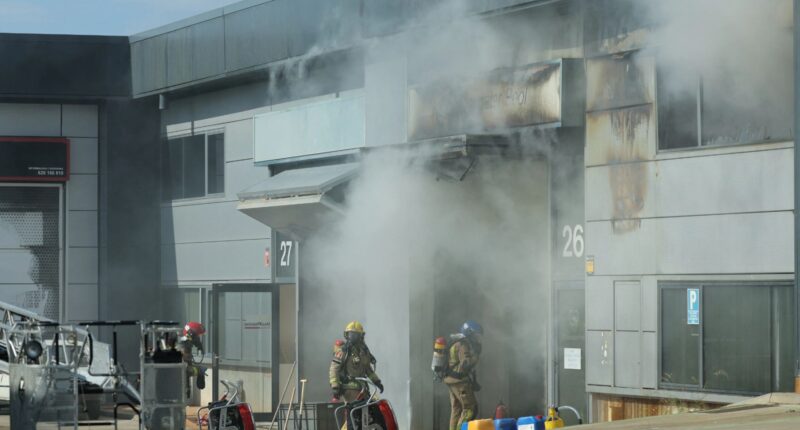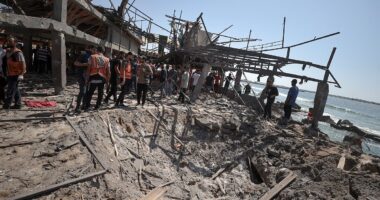Tourists visiting several Spanish beach destinations were advised to remain indoors due to a large fire at a chemical plant that resulted in a dangerous chlorine cloud spreading across the area.
Travelers in five popular towns close to Barcelona were part of the 160,000 individuals instructed to close their windows and stay inside while authorities worked to control the fire.



The incident started at approximately 2:30 am local time at a facility in Vilanova i la Geltru that stored 70 tons of chemicals used for cleaning swimming pools, located just 25 miles south of Barcelona.
The blaze caused a massive chlorine smoke plume to spread across a wide area.
It triggered an emergency lockdown across Vilanova i la Geltru, Cubelles, Les Roquetes de Sant Pere de Ribes, Cunit and Calafell.
In a stark warning on social media, Spain’s Civil Protection service said: “If you are in the affected area, don’t leave your house or your place or work.
“An alert will be sent to mobile phones to inform people about the lockdown.”
They added: “Don’t travel to the affected areas.”
Civil Protection spokesperson Joan Ramon Cabello said the fire had now been brought under control.
But Catalan president Salvador Illa warned the stay-at-home order would remain in place until there was “no risk to the population”.
Mayor of Vilanova i la Geltru Juan Luis Ruiz said: “The priority right now is people’s safety and the rapid extinction of the fire.”
No injuries were reported, although one person is understood to have had a panic attack.
The factory owner Jorge Vinuales Alonso told local radio: “It is very difficult for chlorine to catch fire but when it does so it is very hard to put it out.”
He added that the blaze may have been sparked by a lithium battery.
The drama caused widespread disruption, with trains halted, roads blocked and local events cancelled.
The toxic cloud forced the cancellation of the popular Vida BBQ — a warm-up event for the upcoming Vida Festival, which was set to take place in July in Vilanova i la Geltru with headliners like Supergrass and The Lemon Twigs.
Catalan indie pop band Mishima had been due to perform at the pre-festival bash.
In a statement, organisers said: “We regret to have to inform you that we have been forced to cancel Vida BBQ which was due to take place today, because of an emergency notification issued by Civil Protection.
“According to this notification, a toxic cloud has been detected which represents a risk for the health of the population.
“Civil Protection is recommending the total confinement of the population.
“Faced with this situation our responsibility and commitment to the health and wellbeing of people who were due to attend this event obliges us to take this difficult decision.”
Locals and tourists alike were caught off guard. A receptionist at a three-star hotel in the town said: “All our guests are having to stay inside because no-one can go out.
“It’s a lovely day here so people would normally be on the beach or strolling along the seafront.
“We don’t know how long the lockdown is going to last but obviously we hope it will be soon.
“Vilanova i la Geltru is the sort of area where you get British and Irish tourists even though they’re not the top nationalities in terms of visitors.”


The emergency also brought travel disruption.
Roads in the area were closed and some trains between Sitges and Sant Vicenc de Calders were suspended.
Jorge Vinuales, owner of the chemical firm where the fire began, said the cause was still unclear but may be linked to a lithium battery.
Firefighters confirmed at midday that the situation was under control.
“The fire in Vilanova i la Geltru has been stabilised,” they said.
“We have 24 crews on site. We’re continuing to work on putting out the blaze.”
CIVIL Protection chiefs announced around 12.30pm local time today they had lifted the full lockdown order in most of the affected areas.
They said it was being maintained in a 500-metre radius around the affected factory.
Travel limitations are also still in place for “vulnerable people” in three of the municipalities where locals and holidaymakers had been ordered not to leave their homes, hotels or workplaces.
How toxic is chlorine smoke?
CHLORINE smoke is highly toxic and can be deadly in high concentrations.
What it does to the body: When inhaled, chlorine reacts with moisture in the lungs to form acids that burn and damage tissue.
Symptoms of exposure:
- Burning eyes and throat
- Coughing, wheezing and shortness of breath
- Chest tightness
- Nausea or vomiting
- Skin and eye irritation
Danger levels:
- 1–3 ppm: Mild irritation
- 5–15 ppm: Breathing difficulty
- 30+ ppm: Risk of lung damage
- 400+ ppm: Potentially fatal within minutes
PPM stands for “parts per million” — it’s a unit used to measure the concentration of a substance in air, water, or another medium.
In the context of gases like chlorine, 1 ppm means there is 1 part of chlorine gas for every 1 million parts of air.
It’s a very small amount, but even low levels of certain chemicals (like chlorine) can be harmful to humans depending on exposure time and ventilation.
No antidote: Treatment focuses on getting fresh air, oxygen, and medical support.
Source: GOV.UK
















